- Home
- Fay Weldon
Down Among the Women Page 6
Down Among the Women Read online
Page 6
‘No, I didn’t. I’m not supposed to be upset. In case you’ve forgotten, I’m having a baby any minute. Not that I suppose you care now. You’ve got a grandchild, haven’t you? A girl too. What you wanted.’
It is true. He has longed for a girl. They both have. To replace the baby Scarlet torn from him so many years ago by Witch Wanda. Scarlet is back now in the adult flesh, groaning, bleeding, space-consuming, troublesome. He doesn’t, frankly, want any kind of baby any more.
He puts his arms round Susan. He lies bravely. ‘Never mind,’ he says. ‘Never mind. It’s your baby I want. Our baby.’
But Susan can only respond with petulance. She shakes him off, as her mother did to her, unforgiving, punishing. Twelve (waking) hours without talking for a minor offence: twenty-four (waking) for a major. Then a timed and calculating smile. Susan’s face is set and cross. Kim is disappointed and fears for the first time the triviality of their future together. He takes away his arms, forlorn. He remembers the girl he left his coffee client with—as pretty as Susan, he thinks, and twice as generous, pleased only to give and be given pleasure. Why, the world is full of them. Full of pretty girls. What is the difference between one and another?
Susan’s hand creeps into his. His tightens over hers. Then he goes in to help Mr Justice. She calls after him.
‘Kim.’
He pauses. ‘Well?’
‘I think perhaps I should have my baby in hospital,’ she says, hoping to drive home to him the enormity of the situation. But all he says is, ‘Yes. Perhaps you should.’
Susan is hurt. She cries afresh. She hears someone coming up the stairs. The front door still stands open. Wanda comes in. She too has had a garbled message of desperate phone calls, and has come searching for her daughter.
Susan knows without being told that this is Wanda. And she in her folly has summoned her. Susan makes no move. It is all too terrible. Wanda looks at her briefly, appears to dismiss her.
‘Where is she?’
‘In my bedroom,’ says Susan.
‘Is there a doctor?’ asks Wanda, making towards the bedroom door.
‘Yes. My doctor. And my husband’s in there too.’
Wanda takes time off duty to smile a rare appreciative smile, and then goes into the bedroom.
‘It’s born,’ says Susan, after her. ‘It’s a girl.’
How lucky, Susan thinks, to be Scarlet. Scarlet has everything, and deserves nothing. Susan wants her mother. Susan cries. Susan has a pain.
‘I’m going to have a baby,’ she says into the shambles of her life.
Susan has a slow and difficult labour. It lasts forty-two hours. She is taken to hospital because it seems simpler to the others than to turn Scarlet out so instantly, and besides, nothing at home is now ready for Susan. There is a ’flu epidemic at the hospital. They are short-staffed—Susan’s in the ante-natal ward (no visiting, thank you) for thirty-five hours, with sporadic attention, then moved into the labour room. Here the system, loses touch with her. She lies alone on a high hard narrow couch for six hours, forgotten. She rings the bell but no one comes.
They have gone to tea. She is afraid of moving for fear of falling off the couch. Time passes. The pains intensify until, each time, she is on the verge of fainting, then diminish, bringing her, as might some skilled torturer, back to full consciousness and ready for the next application. Presently she screams, though it scarcely seems to be her who is making this shattering noise. Someone comes running. Figures cluster and move. There is a feeling, she gathers, against anaesthesia. She strikes out at someone. Simeon dives into the world. She is surprised. She has forgotten she is here to have a baby. She has fifteen stitches; her legs strung up to poles specially devised to be fitted to the ends of maternity beds. She gets fearful cramps in her legs—there is a delay, a queue of women, legs strung in preparation for the student stitcher—while she waits, and thinks the pains are almost as bad as the earlier ones. But of course they aren’t.
Poor Susan. Lucky Susan. Her mother, oddly, comes to visit her, almost immediately. She studies the poor lopsided little baby—Simeon was much distorted on his leisurely journey out, though of course the condition will right itself. Or so Susan has been told. Susan’s mother speaks.
‘Still, he’s all right, isn’t he? You never know, when the father’s getting on in years. I was so worried.’
When Kim comes to visit her, Susan can hardly remember who he is.
5 SUSAN IS SELFISH
THERE WILL NOW BE a short intermission. Sales staff will visit all parts of the theatre, selling for your delight whale-fat ice-cream whirled into pink sea waves at two shillings, or ten new pence, the plastic cone; at the apex of each you will find wedged a stiff syrupy strawberry. Or if you prefer, try a hamburger from our foyer stall at only two shillings and sixpence, or thirteen new pence; dig your teeth into the hot pink rubber sausage. The bread is hygienic and aerated (did you know?) with that same substance which creates the foam on your daily detergent.
Truly, yes, truly delicious. Or at any rate, all right by me. Time was when the children had rickets. More hens in the country now than people. Free-range for the hundreds, or battery for the millions, you make your choice. I know which I make. A good woman knows that nature is her enemy. Look at what it does to her. Give her a packet of frozen fish fingers any day, and a spoonful of instant mashed potato, and a commercial on the telly to tell her it’s good. We swallow the lot, we mothers, and laugh.
Down here among the women, or up, up, up, in the tower blocks; those rearing phalluses of man’s delight.
Down here among the women you don’t get to hear about man maltreated; what you hear about is man seducer, man betrayer, man deserter, man the monster.
What did we hear last week, during our afternoons in the park?
Man leaves his wife, young mother of four. She is waiting to go into hospital for her cancer operation. He returns from a holiday abroad, stays a couple of hours, and leaves for good, saying, by way of explanation, he is tired of being married. He probably is, too.
Man runs off with secretary the day his son brings home his first girlfriend.
Man leaves home while his wife’s in hospital having the baby. She comes home to an empty house and unpaid bills. Yet he visited her in hospital, brought her flowers and grapes … no one can understand it.
Man seems not so much wicked as frail, unable to face pain, trouble and growing old.
Yesterday L walked with me. A rich girl, clever, cultivated, desiring to marry M, an equally rich and cultivated person—if married already—much in the public eye. A suitable match for suitable people. How to dispose of the unsuitable wife, but kindly, without hurting her? Without mentioning L’s name? For two whole years, I learn, he professes his love for his wife, whilst making himself as unpleasant to her as he can; finally, in her distress, it is the wife who asks for a divorce. The consummation to be wished. He acts his hurt surprise, his indignation, silent joy mounting in his veins. Rushing to the telephone. She’s asked, she’s asked! At last! Such kindness. Can you imagine such kindness? Yes, truly, they imagine they are kind.
Dear God, preserve us from such love.
Down here among the wage-earners, of course, we don’t have that class of patience. Our love is less lofty. Money and law interfere. Let me quote a poem I know. It is called ‘The Poet to his Wife’.
‘Money-and-law
Stands at the nursery door.
You married me—what for?
My love was not to get you clothes or bread,
But make more poems in my head.
I’ve fathered children.
God!
Am I to die
To turn them out as fits a mother’s eye?
I wanted mothering, and they, this brood
Step in and take my daily food.
Money-and-law
Stands at the nursery door.
Money-and-law, money-and-law
Has the world in its maw.’
> Well.
Susan sits up in her hospital bed. Her father sends flowers: he’s in the United States discovering more about instant coffee. Susan’s stitches are infected. Movement is painful. Kim is kind but thinks she is fussing. Well, it isn’t his first baby. There was, after all, Scarlet, a full twenty years ago.
Scarlet, they (Kim, Wanda, Scarlet and friends, but not Susan) have decided, may as well stay in the flat with her baby daughter until Susan returns with her son. Susan wants to return now, at once. But Susan is running a slight fever in the evenings. The hospital doesn’t want to take any risks. And the baby is not yet back to its birth-weight. Susan’s breasts are cracked and painful. When the baby sucks, male and searching, tears of pain and humiliation spurt from her eyes.
Susan’s mother, and the ward sister, both say she should persevere in breast feeding for Baby’s Sake. Susan perseveres, pumping her strength into the baby for her own sake, not his. She wants her home back. She wants her breasts back, too, for her own. She doesn’t dare ask Kim on his nightly visit if Wanda visits Scarlet.
She won’t decide on a name for the baby. ‘I’d only thought of girls’ names,’ she says. ‘What’s Scarlet calling hers?’
Kim says he doesn’t know. She doesn’t believe him. Kim’s sleeping on the sofa. She’s not sure she believes that, either. But she must believe it, otherwise she’s mad. Men do not sleep with their daughters, let alone when they’ve had a baby only days previously. Nevertheless, Scarlet is in her, Susan’s, matrimonial bed, and Susan is deeply affronted.
Susan’s baby develops an eye infection. He cries in that corner of the upstairs nursery reserved for infected babies. He with his sticky, pus-clogged eye, another with a dermatitis, another with dysentery; they lie in cots six inches apart. Mother isn’t told. They wipe his eyes before he comes down.
Susan can pick out her baby’s cry. It has a different note from the others. In the middle of the night, against all the rules, she hobbles and groans up the stairs to see her baby. She has never wittingly broken a rule in all her life; not even to run in the school corridors, not even to trap and sell for sixpence the miniature frogs, protected by law, which hopped and dived in her antipodean paradise of a back garden.
There is Simeon, segregated, cast out, threatened, eyes closed fast by pus. She clasps him, won’t let him go, backs into a corner with him. Staff come running: they tug, she snaps and bites like a bitch with pups. She is astonished at herself. They think she is mad. So indeed she seems to be. They ring Kim, but he isn’t at home. Wanda is. They tell Susan. They can’t give her tranquillizers, it is too early in the world’s history, so they try pheno-barb; they even let her have the baby beside her for the night.
In the morning Kim comes.
‘You shouldn’t get so upset,’ he says. ‘Lots of babies get eye infections.’
‘Take me out of here.’
‘You’re in no state to go, love. You need a rest.’
‘Rest? Here?’
‘Yes. You’re still feverish at night. Sister said so.’
‘Of course I’m feverish at night after what I’ve been through. If I stay, the baby will go blind.’
‘Don’t be so silly. They’re looking after it perfectly well.’
‘He’s not an “it”.’
‘Very well, looking after him perfectly well. Don’t be so irritable. Try and be calm and relaxed. Scarlet is, and look at the trouble she’s in.’
Susan cannot think of anything to say for a while. Presently she does.
‘Perhaps you’d like to keep Scarlet and put me into a home? She might suit you better.’
‘I can hardly turn my daughter out, Susan, can I?’
‘Yes,’ she says.
‘You are more like your mother than I thought,’ he remarks.
‘And what’s that?’
‘Self-concerned, Susan,’ he says. It is an obvious euphemism.
‘And you’re more like my father,’ she says, ‘than I dreamed. You don’t love me at all. You just use me.’
‘Hush,’ he murmurs—for their voices are raised and other women are looking, as if they did not have enough to stare at already. He had thought Susan so sound, so sweet, so sensible, so pretty. Now here she sits, puffy-eyed, dismal, jealous and complaining. She might almost be Wanda but without, of course, Wanda’s brain. He wonders whether this makes her more or less acceptable, and decides, after all, more. He takes her hand, pats it.
‘You’re a good brave clever girl,’ he says, ‘and I miss you very much. It’s terrible for me at home without you.’
She is mollified.
‘Please let me come home,’ she pleads. ‘Mr Justice can come every day.’
‘Look,’ he says, ‘we get it all free in here. Mr Justice costs money and I have to pay for him looking after Scarlet. We’re a bit tight, you know. I have more dependants than I had before.’
‘I don’t understand you.’ Susan is aghast.
‘I shall have to do something about supporting Scarlet and Byzantia.’
‘Scarlet and who?’
‘Byzantia. That’s what the baby’s called. I’m sorry, I should have told you before. Terrible name, isn’t it? I stood out against it, but she insisted. She’s a romantic girl.’
Susan buries her head in the pillow. She won’t talk to him. It is all too much. He brings her water, smiles nervously round.
‘You’ll dry my milk up,’ she says presently.
‘You’re a good strong healthy natural girl,’ he says. ‘Nonsense.’
‘I suppose Scarlet just overflows.’
‘She does rather,’ he says.
‘In my bed. Or does she spurt it at the walls? They do in here, showing off. It’s disgusting. Does she have to be in my bed?’
‘Where else can she be?’
‘In her own home.’
‘Who would look after her?’
‘Wanda,’ Susan utters the name with disgust.
‘Wanda’s out teaching all day,’ says Kim.
‘And with you all night?’ Susan is sharp now; her eyes grow smaller in her head. Piggy-eyes, her mother used to call her.
‘You’re mad,’ he says. ‘For God’s sake—’
‘She was there when you rang. You weren’t—’
‘What would you have said if I was!’ He laughs, ha-ha-ha. He looks older and greyer, like every man pursued by nagging and doubting.
‘Why was she there and where were you?’
‘She comes in to give the baby its two-o’clock feed so Scarlet can get some sleep,’ he admits at last. ‘I was at the office waiting for a phone call from your father. Ask him if you don’t believe me.’
‘I believe you all right,’ she says. ‘You’re never at home. It’s just a hotel to you. If you’d been home last Sunday like an ordinary husband all this would never have happened. I suppose Scarlet has a nurse by day.’
‘Yes,’ he says. Silence again. Presently—
‘And there’s no money left for me? Your wife?’
‘What else could I do?’ he asks, piteously enough. ‘One must do what one can.’
‘You’ve managed not to for the last twenty years,’ says Susan.
‘One must face one’s responsibilities.’
‘It’s her responsibility, not ours.’
‘She went out and got herself pregnant the day we got married.’
‘So it’s all my fault?’
‘It’s not a question of fault,’ he says lamely, but he feels yes it is Susan’s fault.
Byzantia is a very pretty baby, with a clear pale skin and well-formed features. His son is a dark-red mottled sticky-eyed lump. He has been having long talks with Wanda. She has provoked him almost to the point of believing the time might be ripe for him to start painting again. But how can he, now he has this influx of dependants? At least Wanda works—he can’t see Susan ever doing anything but sit round waiting to be kept. Poor Susan. He smoothes her hair back from her forehead: it has wrinkles there he never
noticed before. She is very tense. He wishes he didn’t have these thoughts about her.
‘Scarlet is part of our lives now,’ he says. ‘We must try and make the best of it, that’s all.’
Nurses erupt from all sides; they move him to one side. It is not within normal visiting hours, so they don’t count him as human. One wheels the baby off; another the locker. Susan watches while her flowers, her breakfast and slices of white bread and butter and raspberry jam disappear. (The hospitals are using up the war-time stocks. Jam is made of turnip pulp, flavouring, cochineal, and—in the popular imagination, at any rate—flecks of wood for raspberry pips.) Other nurses seize Susan’s bed and wheel that off too.
He follows.
‘Where are you taking her?’
‘Ask Sister, please.’ They are firm, brutal and kind all at the same time; armour-bosomed and sexually aware, these smiling girls who watch and observe the processes of motherhood.
He finds Sister in the store room, up a step-ladder investigating a forgotten shelf. She has discovered a false leg lying in the dust; she has not much concentration for Kim. Susan, however, she admits, has a post-puerperal fever.
‘What’s that?’ he asks.
Sister is vague. But Susan is going into the isolation ward. ‘Just to be on the safe side.’ It’s not dangerous, he enquires? Good gracious no, she beams. And she can have the baby with her now, can’t she? Without disturbing the other mothers.
Kim has to be off, back to the office, the three-roomed suite in Mayfair. Susan’s father is away. Kim has to be entire creative and executive departments himself and he is very busy.
But he takes time off to have drinks at lunchtime with his friends in the pub in Oxford Street. Dylan Thomas holds the floor, with a supporting cast of poets. Penguin New Writing is into its fortieth and last edition. The beer is good, if warm; Scotch is back. The Welfare State is being wrought around them. In the Black Horse Kim drinks to celebrate his new fatherhood with friends on the whole rather younger than he is, not long back from the war, duffle-coated, seeking a congenial level—doorman today, BBC producer (radio) tomorrow, who knows? Painters, jazzmen, writers, the first sociologists—the original do-your-own-thing people, widening up the channels of culture for the masses to flow through.

 Trouble
Trouble The Heart of the Country
The Heart of the Country Wicked Women
Wicked Women Mischief
Mischief Long Live the King
Long Live the King Remember Me
Remember Me Worst Fears
Worst Fears Chalcot Crescent
Chalcot Crescent Moon Over Minneapolis
Moon Over Minneapolis The New Countess
The New Countess Splitting
Splitting After the Peace
After the Peace Habits of the House
Habits of the House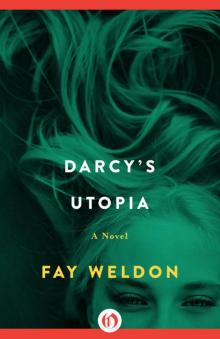 Darcy's Utopia
Darcy's Utopia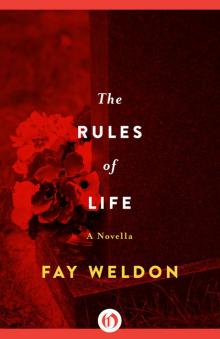 The Rules of Life
The Rules of Life Kehua!
Kehua! Before the War
Before the War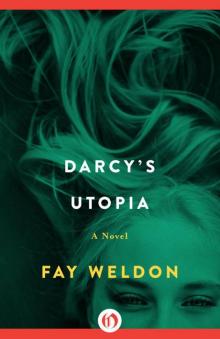 Darcy's Utopia: A Novel
Darcy's Utopia: A Novel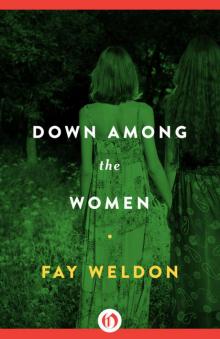 Down Among the Women
Down Among the Women Letters to Alice
Letters to Alice 3 Great Historical Novels
3 Great Historical Novels Female Friends
Female Friends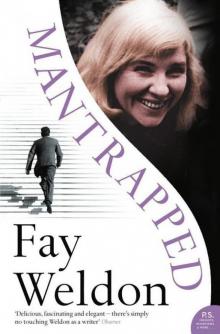 Mantrapped
Mantrapped The Bulgari Connection
The Bulgari Connection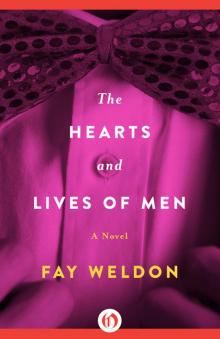 The Hearts and Lives of Men
The Hearts and Lives of Men Death of a She Devil
Death of a She Devil